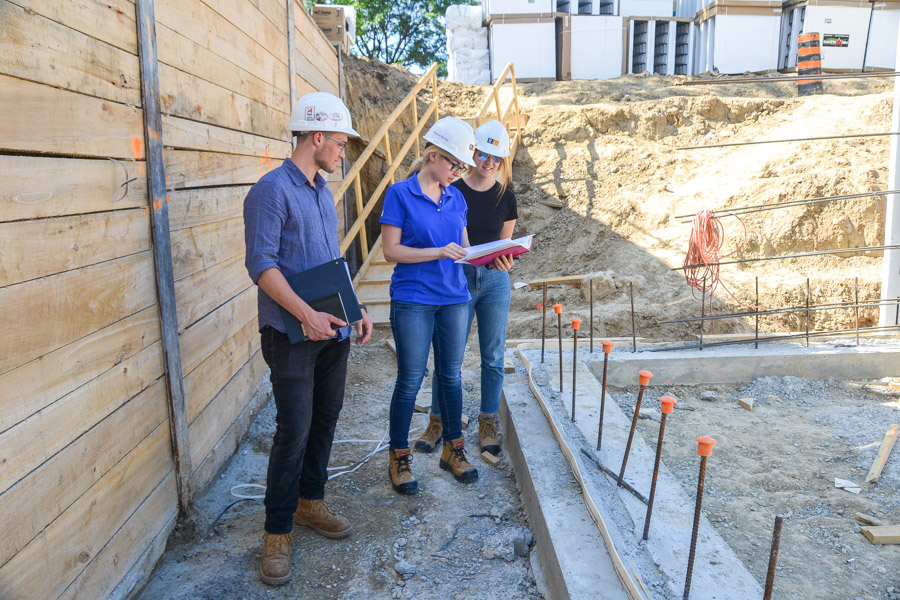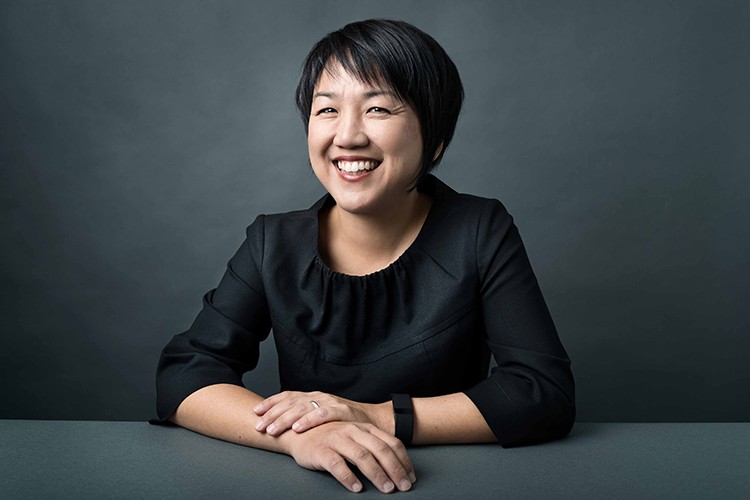FEAS Co-op & Internship Program

Gain meaningful professional experience with our Architectural Science Co-operative Education Internship (ASCEI). As part of your studies, you will have the opportunity to work for leading national and international firms in the architecture, engineering and construction industry—building your resume, your network and your confidence.
Participation in the ASCEI is competitive and will extend your program to five years. After the third year, you will spend one year gaining valuable work experience.
To be eligible for ASCEI, you must be in the top 30% of your class (based on your CGPA after completion of your second year). All offers are conditional on your ability to maintain your grades. In addition, you must be available to work for periods of 4, 8, 12, or 16 months.
The wages listed below represent a compilation of historical salary and wage data reported by students and employers. Wages are subject to change based on employer preferences and prevailing wages in various industry sectors, as well as your individual level of experience (junior, intermediate or senior). The actual wage you will receive is determined between you and the employer during the hiring process. The rates are presented in dollars per hour before deductions. If you have questions, please reach out to the appropriate contact below.
| 1st Work Term | 2nd Work Term | 3rd Work Term | 4th Work Term |
|---|---|---|---|
| $18 - $25 | $18 - $26 | $20 - $27 | $20 - $28 |
12-16 months of experience (May start)
| Year | Fall |
Winter |
Spring/Summer |
|---|---|---|---|
Year 1 |
Study Term |
Study Term |
Optional Study Term |
Year 2 |
Study Term |
Study Term |
Optional Study Term |
Year 3 |
Study Term |
Study Term |
Work Term 1 |
Year 4 |
Work Term 2 |
Work Term 3 |
Work Term 4 |
Year 5 |
Study Term |
Study Term |
Graduation |
For other work-term schedules, contact the academic co-operative internship coordinator.
- Office of Co-operative Education
Instructions on how to submit your application and required documents will be included in the job advertisement on the co-op office’s job posting website. (You will be granted access to this site when you enrol as a student in the ASCEI program.) You are encouraged to apply to as many opportunities as you can find to secure a co-operative internship placement. Our employer partners encompass leaders in the architecture, engineering and construction industry, including award-winning design firms such as Bjarke Ingels Group and Partisans, as well as IBI and ARUP. - Your own contacts
If you secure your own internship you need to contact the academic co-operative internship coordinator to make sure the opportunity is relevant to the academic program and that the work plan meets with the co-operative internship course requirements. Approval on the provided work plan from the academic co-operative internship coordinator must be obtained prior to the commencement of the internship.
The Architectural Science Co-operative Education Internship (ASCEI) is an academic pass or fail course. You will need to complete three of the four co-op work terms to receive the bachelor of architectural science co-operative program degree. You will also have to submit the required reports for each work term, regardless of employment status, to the academic co-operative internship coordinator.
Note: If you have secured your own co-operative internship through your own contacts, you will need to speak with the academic co-operative internship coordinator prior to beginning your internship in order to understand other requirements you may need to satisfy in order for you to meet the course outcomes and earn the credit on your transcript.
There is no application required to participate in the ASCEI program. Forty students will be notified in the fall of their third year if they are qualified to participate based upon CGPAs. The first 32 valid contracts approved by the academic co-operative internship coordinator in the winter term (January - April) will be considered as officially accepted into the program.
If you have been notified and your contract has been approved by the academic co-operative internship coordinator, you may apply for specific positions. Instructions on how to submit your application and required documents will be included in the job advertisement on PlacePro. The deadline to apply for any opportunity is generally one week from the posting date, unless otherwise stated.
1. Cover letter
Address your cover letter to the company to which you are applying. When writing the content, remember that its purpose is different from that of your resume. A cover letter is your opportunity to provide more details about a past experience that may be relevant to the specific employer and position, or that highlights certain technical and problem-solving skills that will benefit the industry. Examples may include experience with past employers, work on relevant projects, or technical and software acumen (Revit, Adobe Suite, digital fabrication, etc.). If you require more guidance on how to write a cover letter, Toronto Met's Career Centre can help.
2. Resume
Be sure to keep your resume brief and relevant to the type of employment the co-operative internship offers. Consider including:
- Computer skills – software you are proficient with and programming languages you know
- Technical skills – workshop or fabrication proficiency
- Relevant employment history – professional experience that demonstrates you are dedicated to your work and can perform well on a team
- Relevant extracurricular activities – any after-school activities that demonstrate useful skills for the workplace, especially design teams
- Education history – any courses relevant to the position that you have excelled in should be highlighted
3. Portfolio
Your portfolio is very important; it demonstrates and validates the skills and experience outlined on your resume. While portfolios can vary in content and configuration depending upon each student’s preferences and skills, your ASCEI portfolio must showcase how you are able to fulfill the needs that a potential employer has presented in the job posting.
Though group work is commonplace at the Department of Architectural Science, your portfolio should highlight your individual contributions, accomplishments and design innovations. Specifically, your portfolio should reflect your academic and professional projects and demonstrate your:
- Software skills – high-impact, technically precise design imagery (i.e. 3D models and renderings)
- Technical skills – examples that showcase your understanding of construction detailing or zoning applications, as well as other technical, regulatory and design parameters
- Diversity of work – varying design typologies, scales and media
Note: Portfolio content should be readily available in both hard copy and online formats.
4. Unofficial transcript
These can be downloaded from MyServiceHub.
You are encouraged to check out information about career support sessions offered by the Career Centre at Toronto Metropolitan University.
Forty students with the top CGPAs in their class (upon entering third year in good standing) will be notified in the fall (September) and presented conditional offers for entering the ASCEI program. The first 32 students with contracts approved by the academic co-operative internship coordinator in the winter term (January - April) will be officially considered enrolled in the bachelor of architectural science, co-operative education degree.
Students applying for placements during the winter term typically will apply for positions through the PlacePro system. The entire process may take between three to five weeks from the time you apply to the offer of employment, and generally involves the following five stages:
- Co-operative opportunities are advertised via the co-op office’s job posting website.
- You apply (instructions will be included on the opportunity posting).
- The Office of Co-operative Education shares your applications with the specific employers you have selected.
- The employer contacts you for an interview. Employers may request to interview you on the company’s premises or on campus. You should be prepared to expect a call or email any time after the application. Some employers may require more than one interview as part of their recruitment process. Typically, the first interview would be with the human resources department and the second would be with the hiring manager.
- The employer shortlists you and offers placement. The employer may contact you directly with their feedback or ask the co-op office to forward the offer to you.
The fee for the program is $3,500.00. This fee is in addition to tuition and incidental fees, and relates to costs associated with the administration of the program. It is calculated in accordance with the Ontario Ministry of Training, Colleges and Universities, and Toronto Metropolitan University policies.
The Career Centre offers a wide range of career readiness support. A dedicated career education specialist can guide you on available tools and services to support you with your applications. To book appointments, and for online tutorials and other information, please visit the Career Centre website.
Academic Co-operative Internship Coordinator
Professor Vincent Hui
416-979-5000, ext. 557962
vincent.hui@torontomu.ca
Primary contact for job description/work plan approval, academic reporting and site visits.
Administrative Contact
Charles Dune
416-979-5000, ext. 556624
charles.dune@torontomu.ca
Primary contact regarding job application process, co-op fees, potential employers, typical co-op employment rates, etc.
Co-op logos can be found here (external link) .

“At Gow Hastings Architects we have been employing DAS co-op students since 2014. Seeing these architects of the future adapt to their first professional assignments gives me great optimism for our profession. DAS students are keen to accept new challenges, learn quickly and produce results that continue to surpass my expectations. I’m still in touch with many of our former DAS co-op students as they complete their education and enter the profession. We see them all as our students, are very proud of them and know they are well equipped to make a difference.”
Valerie Gow
Partner, Gow Hastings Architects
.png)
The Department of Architectural Science has been granted cooperative education accreditation by CEWIL (Co-operative Education and Work-Integrated Learning) Canada Accreditation Council.